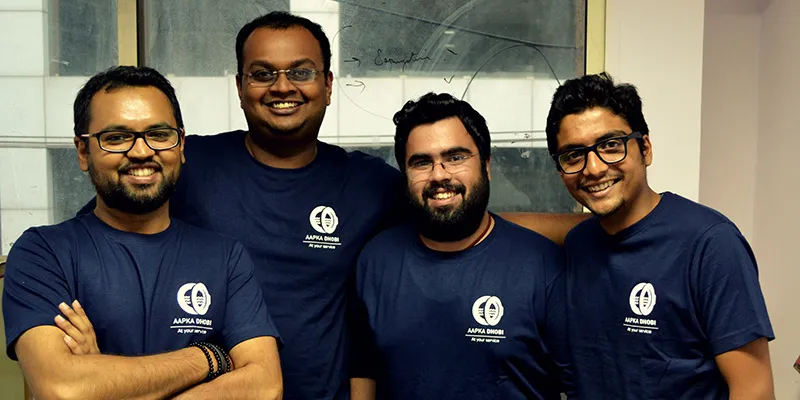Aapka Dhobi makes sure your clothes are washed and returned in 48 hours
Students and working couples constantly worry about their laundry, which gets piled up over the week. They very often have to worry about what to wear for Monday and the rest of the week. If you decide to go out on a weekend, the fact that your clothes are unwashed becomes a cause of worry. Over the last few years, a lot of startups providing laundry services have come up to ease the pain. Aapka Dhobi is a laundry marketplace started by Nidhish Patni, Rohit Raj, Neeraj Kumar, Vineet Ramchandani.
Prior to starting Aapka Dhobi, Nidhish was working in Accenture and had to travel a lot due to his work. After moving to Bangalore he was bitten by the startup bug. As time passed, the urge to startup grew stronger within him. He discussed this problem with Rohit, Vineet, and Neeraj. Rohit is an alumnus of IIT Kharagpur and IIM Ahmedabad and takes care of operations, Vineet takes care of customer delight and experience, and Neeraj hails from IIM Calcutta and has over a decade of experience in marketing.

The friends got together and discussed several ideas. After much deliberation, they zeroed in on the problem of laundry. Nidhish was a frequent traveller and had little time to do his laundry.
They decided that instead of starting another laundry company, it would be better to create a marketplace using technology and leave the laundry job to experts who have been doing it for years. One of the biggest pain-points in laundry space has been the delivery time. They decided to solve this pain-point and convert it into their USP. Aapka Dhobi guarantees the delivery of washed clothes within 48 hours. Nidhish says,
If we receive clothes from the customer in the morning, we deliver it to them within 48 hours. If it is not going to be delivered by then we let the customers know.
How it works
At present, the company has partnered with dhobis in Indiranagar, Koramangala, Whitefield, and BTM layout. Customers can place orders on the website and via call. Once the customer places an order, a dhobi goes to their place and collects the clothes. The company has a contract with dhobis to deliver clothes within 36 hours. This way the company also has a buffer of 12 hours in case of emergency. Meanwhile, the company follows up regularly with the dhobis on a daily basis.
In case of emergency or unexpected situations, like a dhobi taking leave, the company ensures that the workload is shared with another dhobis. In case of an unplanned leave, they first check with the customer and then give the clothes to another dhobi. If there is no urgent requirement then there might be +/- 12 hours time change with the consent of the customers.
"In any situation, the 48-hour time limit is more important than anything else," Nidhish says.
At present, the company is looking to build a robust tech platform. But, at the same time they also agree that tech is not the biggest issue they will have to face. Nidhish says,
Bringing dhobis to a technical platform is not as big a problem as winning their trust. Four years back, even auto drivers were also not tech-savvy as they are now. Initially, it was difficult but over a period of time we gained their trust and have established that relationship. Once they get business from us they will understand that we are here for their benefit.
Some interesting trends
At present, the company has 600+ customers and does around 25–30 transactions since they started. The company has been growing at 100% month-on-month, and has some interesting trends to talk about when it comes to the services and customer preference.
"Since we started our service in August, our ironing services were in great demand, nearly 80% in everything we did.. Now that has changed completely. Today, 50% of our services are for laundry, 44% for ironing, and 6% for dry cleaning. We've also introduced this wash and fold for people do not want some of their clothes to get ironed, like ties or socks," Nidhish says.
Competition and general trends
There is very strong competition in this space, with more startups entering this space every quarter, such as startups like MyWash, which is based out of Bangalore, Pick My Laundry and Tooler, both of which are based out of Delhi. Another Bangalore-based startup Wassup recently acquired Chamak after raising USD 2 million from the founders of Jabong.
Over the last one year, a lot of startups have come up in the laundry space, there are three different models to look at this. The startups can have their own washing machines and this way they can have full control on UX. They can also move to be the marketplace model as Aapka Dhobi is doing and focus on the technological front leaving the laundry part to experts who know it best. Another interesting model to explore is going for the aggregators like HelpChat, HouseJoy and partner with them for orders.







